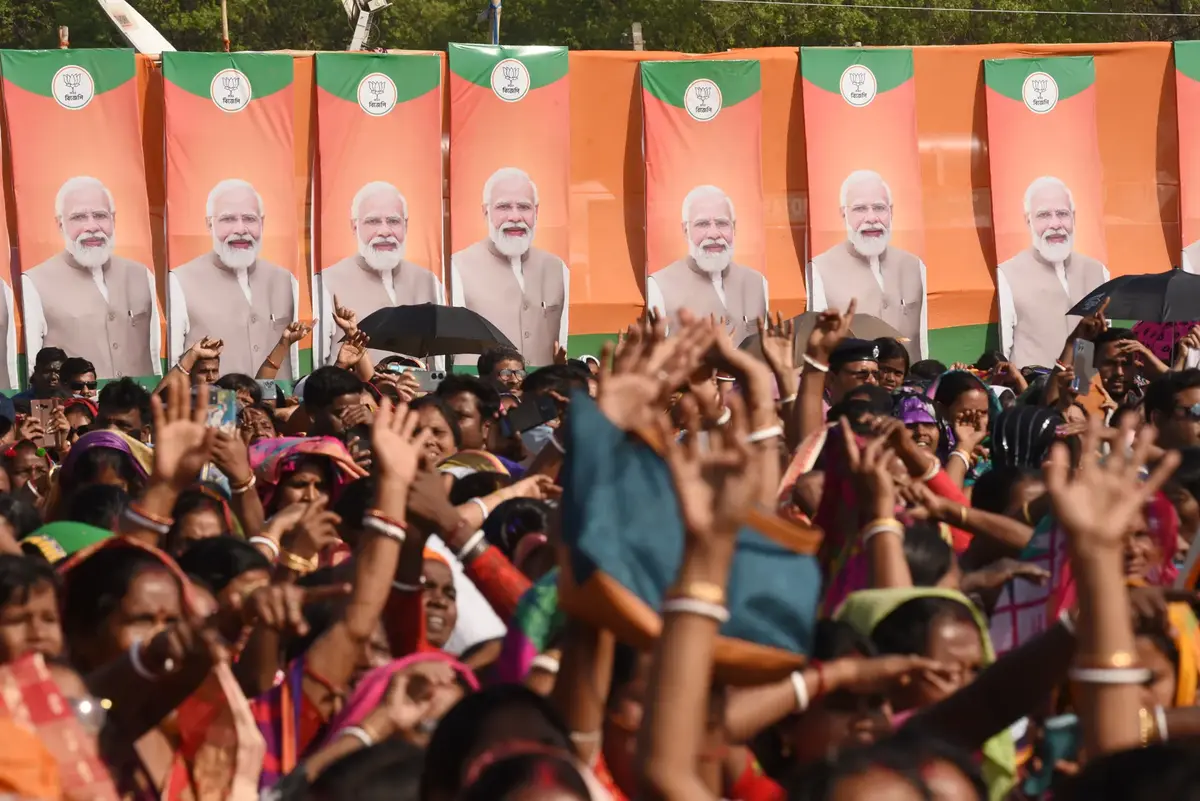Prime Minister Narendra Modi’s official state visit in June 2023 saw a surge of thousands of South Asians flooding the nation’s capital. Some rallied in strong support of the controversial leader; others seized his visit as an opportunity to protest against him and what they perceived as discriminatory policies.
For decades, Indian Americans from diverse religious backgrounds have peacefully coexisted in the United States. However recent occurrences, like the divergent responses to Prime Minister Modi’s visit, serve as a microcosm of the deep-seated division within the Indian community and raise concerns that the extreme political and religious division in India is slowly seeping into diaspora communities.
Hindu nationalism, in India, surged under Modi and his Bharatiya Janata Party, which rose to power in 2014 and was empowered by their landslide election win in 2019.
The ruling party faced significant criticism for the increasing attacks on Muslims and other religious minorities, as well as from some Hindus who argue that Modi’s lack of action empowers right-wing groups and puts national unity at risk. Such conversations are also occurring in the United States but to a different tune.
“All of the mainstream Hindu American organizations were either very vocal and openly supportive of this political ideology and its vision of Hindu identity, ” said Nikhil Mandalaparthy, deputy executive director of the Hindus for Human Rights. “Or they were just silent about what was happening in the name of the Hindu tradition and Hindu community.”
It was under this period of rising tensions that Hindus for Human Rights, a non-profit organization based in Washington D.C., was formed to counteract what Mandalaparthy calls “the American monopoly on the Hindu voice.”
The goal was to inject an inclusive, progressive Hindu voice in policy and advocacy spaces and to establish connections within the Hindu American diaspora in the United States, which wields substantial influence on Indian politics.
“Diaspora money funds a lot of the work of groups like the RSS or the BJP that have a very clear ideological agenda and is really key to a lot of their operations in India,” Mandalaparthy explains. “There’s a very long documented history of money going from Hindu Americans to nonprofits, charities and different organizations that are connected to networks of the Hindu right in India.”
In early 2023, South Asia Citizens Web released a report exposing 24 U.S.-based organizations with links to the Sangh Parivar, an India-based global network of Hindu nationalist organizations.
The report implicates that Sewa International and India Development and Relief Fund, among seven other groups, funded Sangh Parivar-associated initiatives with tens of millions of dollars. The report also names two sponsors, the HSS and VHPA, as having documented ties to extremist Hindu organizations in India.
Despite these links, both the HSS and VHPA are deeply embedded in Hindu American cultural life and “present themselves as authorities on Hinduism” through “identity-based youth programs, cultural events and disseminating Sangh-approved forms of Hindu culture to the diaspora.”
Redefining Hinduism
Hindus for Human Rights seeks to challenge the influence of organizations like HSS and VHPA on how Hinduism is perceived in the diaspora community.
“We have to start by recognizing that today the dominant expression of Hindu identity, whether you’re in India or the diaspora, has really been taken over by Hindu nationalism” explained Nikhil. “There are other ways to be Hindu in a more progressive and inclusive way”.
As an advocate for pluralism, civil and human rights in South Asia and North America, Hindu for Human Rights’ work is rooted in the values of the Hindu faith: shanti (peace), nyaya (justice) and satya (truth). Their vision is a world defined by lokasangraha (the universal common good) — where there is peace among all people.
The organization is committed to the elimination of caste and achieving the right to equality for all the communities that have been marginalized in the name of Hinduism by providing a Hindu voice of resistance.
Their work is infused with these values, spanning from advocacy and community building to countering the disinformation that fuels the propagation of Hindu nationalism in the United States.
Combating Disinformation Campaigns
The digital epidemic that’s taken root in India and the diaspora community is the rapid spread of misinformation and fake news through messaging platforms, particularly WhatsApp.
WhatsApp chat groups are a breeding ground for misinformation, which is particularly damaging during periods of communal tension and violence. They pose a threat to diaspora communities, which have turned to WhatsApp and other messaging apps for the trust and intimacy they afford.
“In Modi’s India, educated young individuals are so polarized and are spreading [false information]on social media against Muslims,” said Ishani Dutta Roy, an editor at ABP News in Kolkata.
Government data show a nearly threefold rise in India of instances of “fake news” and “rumors” from 2019 to 2020, even as social media companies take steps to curb the spread of misinformation.
In a survey conducted in the report Experiences of Muslims in India on Digital Platforms With Anti-Muslim Hate, at least 60% of participants in a survey said they had come across content on digital platforms that incited violence against Muslims.
Because these platforms have shrunk the distance between South Asia and the United States, they are contributing to the spread and amplification of anti-Muslim sentiments between the two communities.
Anti-Muslim disinformation has become even more readily available and persuasive, especially for anyone seeking confirmation of their hatred and deep-seated prejudice.
“The rise of Hindu nationalism has been accompanied by a really strong effort on the part of Hindu nationalist organizations and political parties to dominate the media landscape, particularly social media,” explained Nikhil while describing the type of content they are finding on platforms like WhatsApp, Instagram or Facebook. “In many cases, the messages that are sent on these platforms can sometimes be the trigger for actual on the ground violence.”
In response, the organization launched Voices of Peace and Ulti Pulti Baat — programs that aim at the influence of religious extremism and hate speech on vulnerable communities and seek to debunk misinformation.
Activists, scholars and community leaders come together through webinars, panel discussions and other events to discuss issues related to human rights and social justice. They promote dialogue as a method to foster a culture of peace and nonviolence in South Asia and beyond.
The goal of these initiatives is to target everyday Hindus through WhatsApp groups and the social media ecosystem to inject a different perspective.
“It’s all about getting into the same places where right now, the only Hindu voices are from the Hindu right and offering an inclusive, progressive alternative,” said Nikhil.
Speaking Across the Divide
Although countering disinformation can be a useful approach to reducing communal tensions in the United States and abroad, it is equally important to engage in on-the-ground efforts to facilitate civil dialogue on challenging issues that impact the Indian community.
Hindus for Human Rights is doing exactly that through their Desh Videsh series.
“We go into communities where there [are]high concentrations of South Asians and create opportunities for Hindus and Muslims to be able to talk about issues that are dividing the community, that are leading to more and more polarization,” explained Nikhil.
The debut event took place in Jan 2023 at the Indian Community Center in Milpitas, California — the heart of the Bay Area and home to a large Indian population. The conversation delved into the history and severe clauses of the Unlawful Activities Prevention Act, along with the persecution of minority groups in India.
By facilitating dialogue and featuring expert opinions, the initiative aims to bridge gaps between people with differing perspectives.
While these dialogues often include both civil and uncivil disagreements, progress stems from the exposure and willingness to have these conversations. Hindus for Human Rights’ attempts at outreach and bridge-building are one-of-a-kind and happen in collaboration with many other forces.
“All of our work is done in coalition, in partnership with Muslim groups and secular organizations. We’re coming in as a united front representing the whole diversity of the Indian diaspora” said Nikhil. The Desh Videsh series is the beginning of bridges being built between these two communities and creating a safe space for individuals to interact with those across the aisle.
It also provides Hindus for Human Rights an opportunity to show members of the diaspora community the literal consequences of nationalism and anti-muslim sentiment, focusing specifically on cases of persecuted individuals in India.
Advocacy
The National Crime Records Bureau in 2021 reported that over 30% of all detainees in Indian prisons were Muslims, despite the community only making up 14.2% of the total population.
A combination of factors has kept the statistic consistent, including police bias resulting in baseless charges, inadequate representation of Muslims in law enforcement and insufficient or non-existent legal assistance.
Faisal Khan, a victim of the Indian justice system, was associated with both Khudai Kidmatgar, a non-violent freedom movement, and the National Alliance of People’s Movements (NAPM) for the past 15 years. As an activist, he pushed for communal harmony between Hindus and Muslims.
Khan and his group Khudai Khidmatgar conducted a journey in Brij, Uttar Pradesh, where they visited the Nand Baba Temple and were invited to pray by the priest.
Four days later, Khan was arrested and charged with conducting Muslim prayers in a Hindu temple without permission and creating disharmony, as well as using Khudai Kidmatgar to raise funds for malicious purposes from foreign sources. The charges were filed by the same priest who had invited Faisal to pray.
Hindus for Human Rights organized numerous press conferences and met with US House of Representative officials and individuals in the State Department to voice their apprehensions regarding the events taking place in India.
“For the last several years, whenever [government agencies]have been looking for the Hindu community perspective, the only groups that are out there responding or reaching out to them are coming from the Hindu right, from the Hindu nationalist perspective,” stated Nikhil.
The organization summoned human rights defenders and interfaith activists to speak up on Khan’s behalf. Eventually, Khan was released.
Media coverage and international attention can be crucial in cases like these. Authoritarian governments are particularly sensitive about being publicly shamed on the global platform and don’t want these issues to be discussed beyond its borders.
Hindus for Human Rights takes advantage of this and utilizes its influence and scope to raise awareness regarding instances such as Kahn’s and the numerous others in India who are being unjustly persecuted.
By advocating for persecuted individuals in India, spearheading campaigns against the dissemination of misinformation among the diaspora, and fostering a sense of a unified community, Hindus for Human Rights hopes to change the political climate.
“If we win the culture and politics in the states, if we increase our voice here, then our political influence becomes stronger in India,” said David Kalal, communications director for the organization, “That’s the vision, that’s what we are working towards and why I joined this organization. ”







